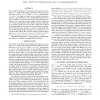Free Online Productivity Tools
i2Speak
i2Symbol
i2OCR
iTex2Img
iWeb2Print
iWeb2Shot
i2Type
iPdf2Split
iPdf2Merge
i2Bopomofo
i2Arabic
i2Style
i2Image
i2PDF
iLatex2Rtf
Sci2ools
137
click to vote
ICIP
2008
IEEE
2008
IEEE
Kalman filtered Compressed Sensing
We consider the problem of reconstructing time sequences of spatially sparse signals (with unknown and time-varying sparsity patterns) from a limited number of linear "incoherent" measurements, in real-time. The signals are sparse in some transform domain referred to as the sparsity basis. For a single spatial signal, the solution is provided by Compressed Sensing (CS). The question that we address is, for a sequence of sparse signals, can we do better than CS, if (a) the sparsity pattern of the signal's transform coefficients' vector changes slowly over time, and (b) a simple prior model on the temporal dynamics of its current non-zero elements is available. The overall idea of our solution is to use CS to estimate the support set of the initial signal's transform vector. At future times, run a reduced order Kalman filter with the currently estimated support and estimate new additions to the support set by applying CS to the Kalman innovations or filtering er...
ICIP 2008 | Image Processing | Reduced Order Kalman | Sparse Signals | Sparsity Basis | Sparsity Pattern | Time-varying Sparsity Patterns |
Related Content
| Added | 20 Oct 2009 |
| Updated | 20 Oct 2009 |
| Type | Conference |
| Year | 2008 |
| Where | ICIP |
| Authors | Namrata Vaswani |
Comments (0)

